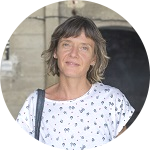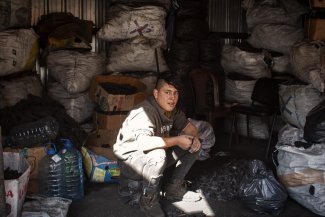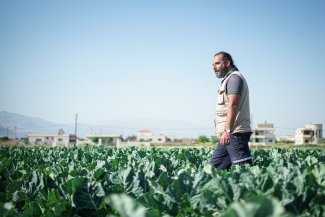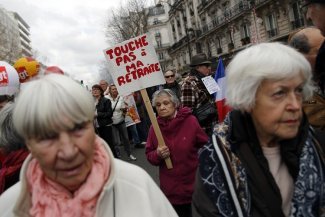Eighty-three-year-old Saijun Inqiyan at Heaven’s Joy (Bonheur Du Ciel) soup kitchen at Father Majdi Allawi’s church.
Eighty-three-year-old Saijun Inqiyan sits, letting time pass, as if awaiting his turn at the dentist’s. The dining room is not yet ready. Two volunteer cooks carry trays of rice, salad and vegetables to the ‘altar’, to be blessed by Father Allawi, before serving them to the needy. A voice calls out to the diners. Inqiyan struggles to his feet. His movements are awkward and he relies on a cane to walk. Slowly but surely, the old man makes his way down the corridor to the dining room and chooses his place at a table he will share with other elderly people.
Focused on the task at hand, they do not speak to each other until they have finished eating. Then they leave, to make way for a new group of diners. For all these people, the only help they receive is that offered by Father Allawi and Heaven’s Joy provides them with the only hot meal they’ll have that day.
“I’m on my own. I don’t have a pension and I don’t receive any help from social services. I don’t know what would become of me if it wasn’t for Father Allawi’s charity,” exclaims Inqiyan, who is full of praise for the parish priest. The elderly man lives in rented accommodation, with an old tenancy agreement. The payments are covered by Father Allawi’s church.
Unfortunately, cases like Inqiyan’s are more the rule than the exception in Lebanon.
Over the past decade, the country has been grappling with the Syrian refugee crisis and, more recently, with an unprecedented economic crisis, made worse by the Covid-19 pandemic and the massive explosion in the Port of Beirut in August 2020. The social, health and food needs of both the refugee and the local populations have become even more acute as a result. More than half of Lebanon’s population – 55 per cent out of a total population of 6.8 million, including 1.5 million refugees – currently lives below the poverty line, and 23 per cent lives in extreme poverty, according to World Bank figures.
Lebanon’s elderly dependants have been hit head-on by recent blows to the country. They feel abandoned by the state and are having to turn to charity to survive. But, even before the most recent string of crises, Lebanon’s health system and social services were already hugely lacking and the help available to its elderly was already virtually non-existent.
Same lack of state planning and ever-growing numbers of elderly dependants
As the World Health Organization (WHO) highlights, population ageing has never been a priority area in Lebanon. Evidence of this is the shortage of geriatric wards in public and private hospitals, the rarity of geriatrics in medical or nursing curricula, and the complete absence of social workers specialised in gerontology.
There are 36 residential centres for the elderly, with a total of 6,000 beds, but most of them “lack specialised staff and the services they offer are very limited” – there are no rehabilitation, preventive or therapeutic services, Nour Najem, chair of Lebanon Needs, tells Equal Times.
“We cannot expect charitable associations to fill the gaps in the government’s social and health care services, as they are under-resourced and the volunteer staff working with them are not specialised in elderly care and health. There are many foundations and religious associations that want to help vulnerable communities, but their good deeds do not always help and can make matters worse for the elderly,” warns Najem.
“Older people need to watch their diet, for example, but they are often given sugary drinks or foods with saturated fats that do nothing to benefit their health,” she explains.
In her view, many of the health problems faced by the elderly “could be prevented with proper care and regular health check-ups, which would help prevent overcrowding in hospitals” at crucial times, such as during the current coronavirus pandemic.
During the months spent in isolation due to the pandemic, “many elderly people living alone found themselves completely cut off from regular care and assistance, which has affected their health,” says Najem.
“The situation has really highlighted the need to train volunteers, social workers and municipal employees in health, Covid prevention and screening and community-based first aid to help care for the elderly at home,” says the head of the Lebanon Needs team.
Global population ageing is another factor to be taken into account. In the case of Lebanon, by 2025, people aged 65 and older are forecast to make up 10.2 per cent of the population, replacing the younger population as the main economic dependants of families, according to WHO forecasts.
“Culturally, the family is still seen as the main provider of financial and social care for the elderly in Lebanon, but the family unit sharing the burden of care is ever smaller,” Lebanese economist Rami Mourad tells Equal Times.
Lebanon’s fertility rate has gradually fallen from 4.8 births per woman in 1971 to 2.1 in 2020. At the same time, the economic crisis has increased the emigration rate among qualified young people in recent years: by 89 per cent in 2019 compared to 2018, and by around 47 per cent in 2020 relative to the previous year.
“As a result of the low fertility rates, increased life expectancy and emigration, the elderly no longer have any assurance of financial security, as it is usually their children who have to provide for them due to the lack of old-age pensions,” warns Mourad.
The pension system in Lebanon only provides for civil servants and the military, who receive a regular pension and access to social services when they retire. Private sector employees, for their part, are covered by the end-of-service indemnity scheme, under which they receive a lump sum equivalent to one month’s pay for every year worked when they retire, and no longer receive free health insurance. Given that public employees represent less than 20 per cent of the overall workforce in Lebanon – a workforce of 2.32 million people in 2020, according to the World Bank – the remaining 80 per cent are potentially left unprotected (because they work in the private sector or in the informal economy).
In addition, considering that the Lebanese pound has lost more than 90 per cent of its value against the dollar as a result of the devastating economic crisis now underway, the lump sum received on retirement amounts to very little.
At the time when they need it most, elderly people find themselves being stripped of social protection and left financially dependent on their children, turning them into a burden on the family.
The sense of vulnerability in old age is heightened among women, most of whom have never had a paid job (as many as 94 per cent) and are dependent on their husbands.
When 67-year-old Hartum Meridian lost her husband, three years ago, she was left with no income and had to move in with her eldest daughter, who is married with two children. Her son-in-law used to work at the Port of Beirut, for a metallurgy company that was blown away by the massive explosion on 4 August. He has not worked since, and as his employer has gone bankrupt, nor has he received any financial compensation.
“We used to live comfortably. I never had to ask anyone for money or to beg. My husband died and I was left with nothing. And now my daughter’s family can’t take care of me either. I’ve found myself living on charity from one day to the next,” she laments, as she waits in line for breakfast at a bakery that distributes free manousheh (a kind of Lebanese-style pizza) to the most disadvantaged members of the community in Bourj Hammoud.
An even bleaker landscape for elderly refugees
The socio-economic and health needs of elderly refugees are multiplying. “Most elderly refugees depend on humanitarian assistance to meet their basic needs, because they have no way of earning a living,” explains Ali Khedr, head of communications for the non-profit organisation Syrian Eyes.
According to the UN Refugee Agency (UNHCR), the over-60s represent around 2.5 per cent of the 885,000 Syrian refugees currently registered.
But not all older refugees have been able to register with UNHCR offices, which means “they are not able to benefit from international humanitarian aid and have not been able to register for the national Covid-19 vaccination scheme,” Khedr points out.
“The situation is catastrophic for the refugees,” he exclaims, referring to the fact that the numbers living beneath the extreme poverty line rose to 89 per cent in 2020.
Many of the Syrian families struggling to survive end up taking out informal loans, because “they cannot cover their basic needs and the cost of medicines with ration cards from the World Food Programme (WFP) alone,” he warns.
Older people generally have more health problems and need regular medication, but “the UNHCR does not cover the costs of medicines or the treatment of chronic diseases, and the NGOs have limited resources and cannot reach all the elderly refugees in need of medicines,” he adds.
“It’s a vicious cycle. They are being driven deeper into poverty and debt every day,” concludes Khedr.













